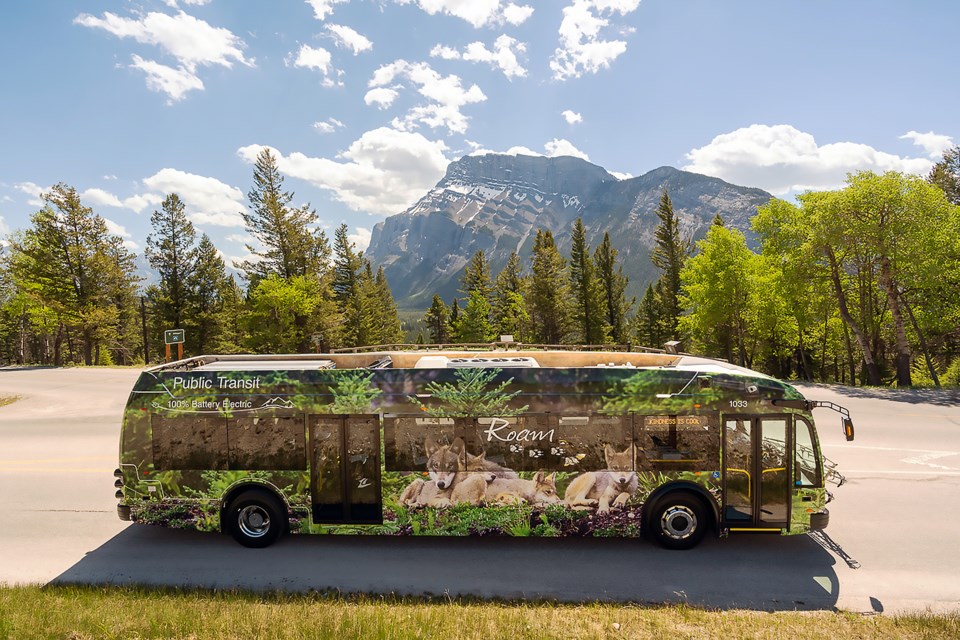BANFF, ALTA – A $12.9 million five-year agreement between the Bow Valley Regional Transit Service Commission and Parks Canada will help purchase electric buses as part of the overall goal to reduce car use and road emissions.
The agreement, which was announced Tuesday (March 22), will see an additional three electric buses purchased for routes in the summer of 2023. The three buses will eventually join an already prominent electric fleet.
“We’re very excited about this agreement. The emissions are significantly lower on electric buses; maintenance costs and need for maintenance is lower as well,” said Martin Bean, the chief administrative officer of Roam transit.
Bean said by the summer of 2023, almost 30 per cent of its fleet will be electric – 10 of 32 buses – giving the commission one of the larger electric fleets by percentage in the entire country.
“We’re seeing good reliability from our electric buses and lots of positive comments from the community and visitors,” he said.
“We’re well ahead of a lot of agencies and having a percentage of our fleet be electric in such a short timeframe."
The money will be spread out over the length of the contract to allow the new electric buses to be purchased and to help with operation costs.
The five-year deal was reached after a three-year deal expired. The longer term deal will allow Parks Canada and BVRTSC to work together to do long-term planning such as examining new routes, improving others through schedule frequency or adjustments.
“I applaud (Roam transit’s) ongoing commitment to safe and efficient travel for area residents and tourists," said Rajan Sawhney, Alberta’s Minister of Transportation in a media release. "The investment will create new opportunities to visit the mountains, catch a ride to work, or meet up with family and friends."
Banff-Kananaskis MLA Miranda Rosin echoed Sawhney’s statement.
“Roam transit has played a pivotal role in helping our Bow Valley communities manage the high visitation and traffic congestion at Canada’s most iconic Rocky Mountain destinations, while also providing cost-effective transit options for local residents,” she said in a media release.
The Town of Banff will also begin fare free transit for residents on May 20, while the Town of Canmore will see increased weekday service to every 35 minutes and increased service on Sundays. The local Canmore route will split into a 5a and 5b on April 4 to help coverage on either side of the Trans-Canada Highway.
A pair of electric buses was approved by BVRTSC at its Feb. 9 meeting. The two buses will replace hybrid buses that had developed battery pack issues near the end of their service lives and were scheduled to soon be replaced.
The issues gave the commission options of repairing equipment for about $250,000 that would’ve been phased out in three years, or proceeding with the addition of electric buses in a continued push toward net-zero transit.
While costly, the bulk of the funding for those two buses will come from the province’s GreenTRIP funding. The program – run by Alberta Transportation – was planned to end, but ultimately extended to March 2023. It covers up to two-thirds of electric bus purchases.
It is not yet known what level of funding the province will offer following the conclusion of the GreenTRIP program for electric buses.
The two buses will cost a combined $2.736 million, but the GreenTrip program will cover $1.815 million. The remainder of the cost will be picked up from previously established capital reserves designed to be used with bus replacement and operating reserves.
The transit commission will continue to look at electric options, Bean said, particularly as technology is improved to accommodate longer distances needed for some Bow Valley routes.
Increased elevation can also impact travel distances, with electric buses covering about 300 kilometres before needing to be recharged.
Though one of the longer routes in Lake Louise completes about 700km of driving a day and means an electric bus isn’t yet an option, Bean expressed optimism on the pace of new technology being developed.
“It’s a definite improvement and we’re hoping that we can start to bring electric buses into the regional service in a fairly short timeframe," he said.
"We’re anticipating battery technology will continue to improve over the next few years to be able to do that. They currently don’t have the range we would need to do a Lake Louise service or Banff to Canmore service continuously all day.”


